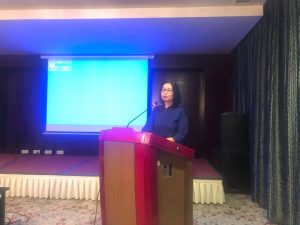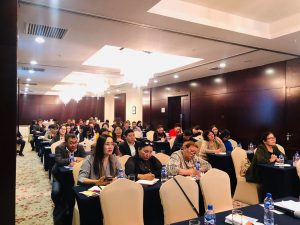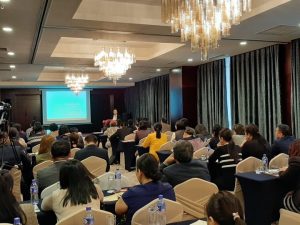 Ulaanbaatar, Mongolia, November 14, 2019 – GGGI Mongolia hosted a knowledge-sharing event together with MET, with the aim to introduce and share best practices to replace HOB heating systems with three pilot green innovations for low-carbon technologies for off-grid buildings of remote ger district schools and kindergartens in Ulaanbaatar.
Ulaanbaatar, Mongolia, November 14, 2019 – GGGI Mongolia hosted a knowledge-sharing event together with MET, with the aim to introduce and share best practices to replace HOB heating systems with three pilot green innovations for low-carbon technologies for off-grid buildings of remote ger district schools and kindergartens in Ulaanbaatar.
The Government of Mongolia decided to pilot three different green technologies for heating to replace coal boilers with geothermal heat pumps and gas and electric boilers at 21 schools and kindergartens in total. The total allocated state budget for those pilot projects is about USD $762,000.
 The pilot project is expected to demonstrate significant contribution to reducing air and environmental pollution and the consumption of raw coal for space heating. Mr. Munkhbaatar, CEO for Z&X company, which is the contractor for implementing the geothermal heat pump project, introduced its work progress and expected results. The Business Case Study results demonstrated that small-scale low carbon heating systems, combined with the use of current HOBs, can be financially affordable and technically viable for the scale-up of phasing out heat-only boilers in the long run. Two other companies, GasCom LLC for Gas heating technology and Best Energy serving LLC for Electric boiler heating technology, introduced their work progress as well.
The pilot project is expected to demonstrate significant contribution to reducing air and environmental pollution and the consumption of raw coal for space heating. Mr. Munkhbaatar, CEO for Z&X company, which is the contractor for implementing the geothermal heat pump project, introduced its work progress and expected results. The Business Case Study results demonstrated that small-scale low carbon heating systems, combined with the use of current HOBs, can be financially affordable and technically viable for the scale-up of phasing out heat-only boilers in the long run. Two other companies, GasCom LLC for Gas heating technology and Best Energy serving LLC for Electric boiler heating technology, introduced their work progress as well.
Mrs. Uranchimeg, DG for Clean technology, Innovation and Production division of MET, highlighted GGGI’s great contribution in providing continuous support for the whole process of piloting these green technologies, from planning to implementation stages.
 The National Program for Reducing Air and Environmental Pollution (NAP) set forth commitments on comprehensive measures to reduce air pollution with the objective “to reduce air, water and soil pollution and implement appropriate waste management in cities and other urban areas”. The NAP aims to reduce PM2.5 particulate to 70 mcg/m3 from 256 mcg/m3 (2016); PM10 particulate to 100 mcg/m3 from 279 mcg/m3 (2016), and Sulfur Oxides (SO2) to 50 mcg/m3 from 89 (2016) by the end of 2025. According to the NAP, household stoves in ger districts and 3200 heat-only boilers operated for space heating were responsible for 80% of all air pollution, 400,000 vehicles were responsible for 10%, thermal power stations generated 5-6%, and smoke, smog, and dust from ash reservoirs, roads, and outdoor waste caused 4%.
The National Program for Reducing Air and Environmental Pollution (NAP) set forth commitments on comprehensive measures to reduce air pollution with the objective “to reduce air, water and soil pollution and implement appropriate waste management in cities and other urban areas”. The NAP aims to reduce PM2.5 particulate to 70 mcg/m3 from 256 mcg/m3 (2016); PM10 particulate to 100 mcg/m3 from 279 mcg/m3 (2016), and Sulfur Oxides (SO2) to 50 mcg/m3 from 89 (2016) by the end of 2025. According to the NAP, household stoves in ger districts and 3200 heat-only boilers operated for space heating were responsible for 80% of all air pollution, 400,000 vehicles were responsible for 10%, thermal power stations generated 5-6%, and smoke, smog, and dust from ash reservoirs, roads, and outdoor waste caused 4%.
In support to the GoM’s immediate agenda to promote clean energy and reduce urban air pollution, GHG emissions, and consumption of raw coals, GGGI developed this business case study to identify Low-Carbon Small Scale Heating solutions for off-grid buildings in peri-urban areas of Ulaanbaatar city. The business case was successfully delivered to the Ministry of Environment and Tourism (MET), the Ministry of Energy (MoE), the Ministry of Education, Culture and Science (MECS), the Education Department of Ulaanbaatar /UB/ city (EDUB), and the Energy Regulatory Commission (ERC).
For the Public School #122 school, located in Songinokhairkhan district, Ulaanbaatar, the School building was constructed with the Japan International Cooperation Agency (JICA) Japanese Grant Aid Project in 2013. The Songinokhairkhan district is a highly populated area where five public schools, including the School 122, operate in three-shifts. As of 2018, the number of students of the school is about 2000, even though the school capacity is only 640 children. To reduce classroom-load, the ADB will be constructing another complex to the school using the green building design delivered by the UN-PAGE program in 2019.